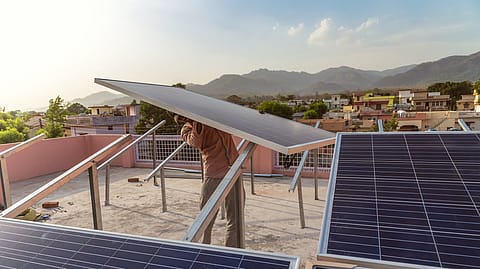Gautam Solar bets big on India with ₹1,900 cr expansion
The company, which currently can produce 3.2 gigawatts of modules—1 GW in Haridwar and 2.2 GW in Bhiwani, Haryana—is expanding its capacity to 5 GW

Gautam Solar, one of the largest domestic solar module manufacturers, is expanding its capacity with an investment of Rs 1,900 crore to meet India's growing demand.
The company, which currently has the capacity to produce 3.2 gigawatts of modules—1 GW in Haridwar and 2.2 GW in Bhiwani, Haryana—is further expanding its capacity to 5 GW. "We may further increase capacity depending on demand. At present, we have an order book for nearly 5 GW, executable in the next 8-10 months," said Gautam Mohanka, CEO of Gautam Solar, in an exclusive interaction with Fortune India.
Additionally, Gautam Solar plans to set up 2 GW of solar cell manufacturing capacity and has identified two locations for the project, expected to be completed within 18 months. The estimated investment for this expansion is around Rs 1,500 crore. The total investment in cells and modules will amount to approximately Rs 1,900 crore.
"The first 500 megawatts will be funded through internal accruals and bank debt, while the remaining 1.5 gigawatts will be financed through an initial public offering (IPO). Since IPOs take time, we will not delay expansion while waiting for it to materialise," said Mohanka.
Founded by B.K. Mohanka in 1998, Gautam Solar is one of India's pioneering solar companies. It reported revenues of approximately Rs 900 crore in FY24 and is expected to close FY25 at around Rs 1,200 crore.
Currently, the company is focused on the Indian market, given the country's ambitious target of 500 GW of renewable energy by 2030. "We have also begun small-scale exports to the U.S., but we will wait and observe how solar energy demand evolves in that market before considering setting up facilities there," said Mohanka.
Diversification into solar cell manufacturing aims to reduce dependence on China, from where most solar cells are currently imported. To encourage domestic manufacturing, India imposes duties on imported solar cells from China, with total levies—including basic customs duty (BCD) and other charges—amounting to approximately 24-25%. Recently, India also imposed duties on floating glass imports from China, Hong Kong, and Vietnam, which is expected to drive up solar module prices.
Recommended Stories
"Various manufacturers have announced capacity expansions in solar cells, and once those come online, prices will drop to match Chinese prices," Mohanka added.